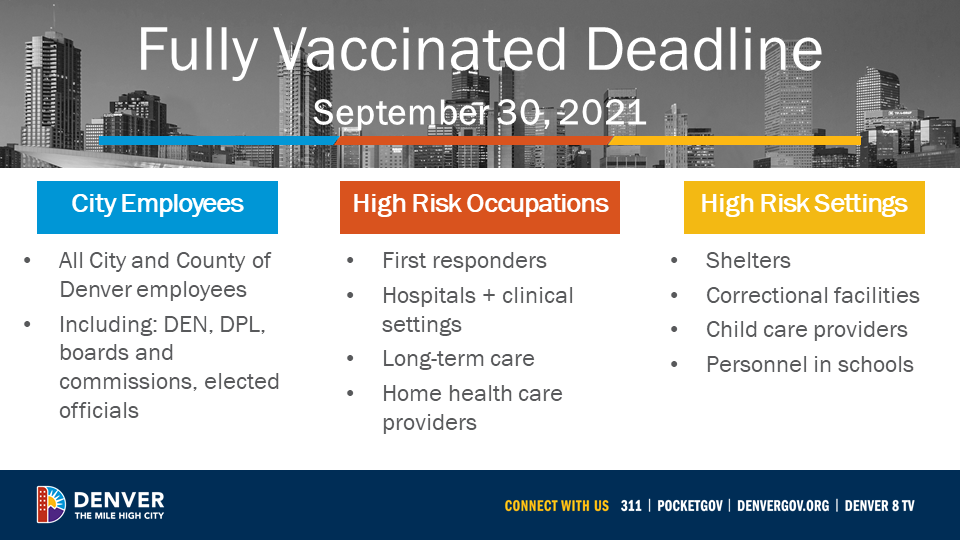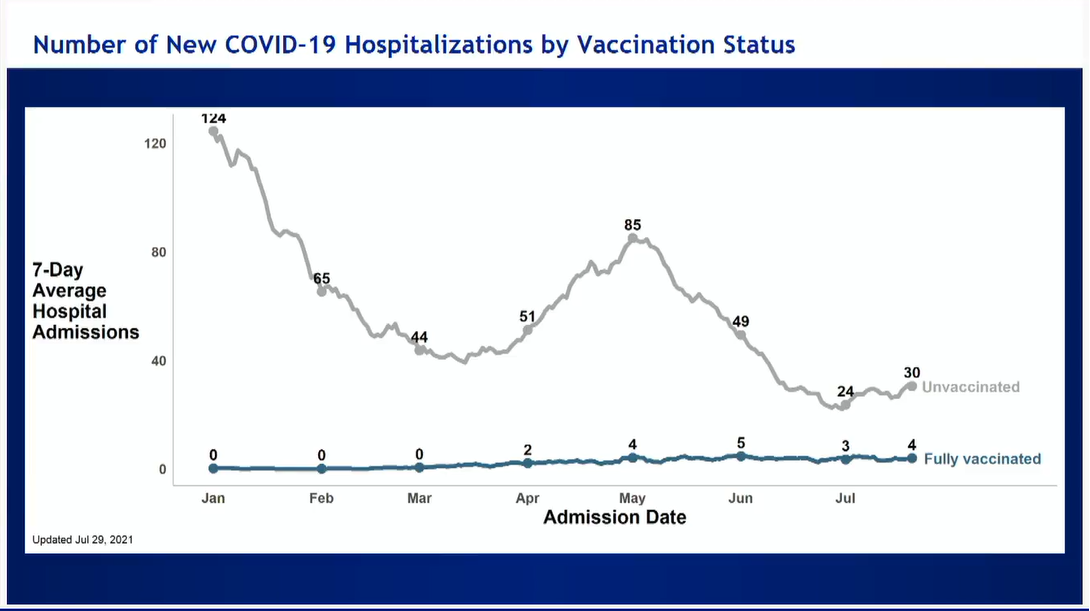Denver announces vaccine requirements as COVID-19 cases, hospitalizations climb across the state

DENVER — Mayor Michael B. Hancock announced a “far-reaching” health order August 2 requiring all city employees, including some private sector entities in high-risk settings, to be fully vaccinated by September 30. The new order comes as the highly-contagious Delta variant of COVID-19 rages across the country.
“No one wants to relive the horrors of last year. No one wants to see another stay at home order,” Hancock said in a press conference. “Even our 70 percent vaccination rate among those eligible is not enough to fully protect our residents, families, and businesses, or the economy from another devastating blow this fall and winter.”
With this order, over 10,000 employees including teachers, police officers and people working in nursing homes and correctional facilities will be required to receive the first dose of the COVID-19 vaccine by September 15, before returning to work in October.

Unlike some cities, Denver is not requiring face coverings in indoor settings.
“The only way out of this is with mandatory vaccinations,” said Bob McDonald, the executive director of Denver Department of Public Health and Environment (DDPHE).
According to Hancock and McDonald, Denver’s relatively high vaccination rate is not enough to combat the Delta variant, which new evidence shows is more contagious than Ebola and just as contagious as chickenpox. Since January, non-vaccinated people made up 96 percent of hospitalizations. The Delta variant, according to state epidemiologist Dr. Rachel Herlihy, is now responsible for more than 95 percent of the new cases statewide.
As for enforcement of Denver's mandate, employers will be responsible for its employees’ compliance with vaccination and maintaining records to “demonstrate compliance.”
“Our goal is compliance,” city attorney Kristin Bronson said. “We obviously have an ordinance that allows us to impose penalties for non-compliance but our first approach to enforcement will be to work with the employer to gain compliance.”
The new order doesn't affect the city’s current mask mandates which requires face coverings for unvaccinated employees, patients, and visitors in homeless shelters, correctional facilities, and any healthcare settings.
For more information on where to find the COVID-19 vaccine, visit the Colorado Department of Public Health and Environment. You can watch Hancock's full presser below.
In his own August 2 press conference, Governor Jared Polis applauded Hancock and city leaders for the new vaccine requirement. Polis also announced that 70 percent of the state's vaccine-eligible population—those ages 12 and up—have received at lease one dose of the COVID-19 vaccine.
Nevertheless, cases and hospitalizations are climbing in Colorado, likely due to the high transmissibility of the Delta variant. Herlihy joined Polis at the press conference to go over recent data, which showed the most dramatic increases in COVID-19 cases are happening among the unvaccinated. (Polis said that not getting a vaccine was like waving a metal rode outside during a lightning storm.)
Herlihy emphasized that the vaccines remain "highly effective" but that there have been more "breakthrough cases," meaning that more vaccinated people are testing positive for COVID-19. It should be noted, however, that the vaccinated people testing positive for COVID-19 are far less likely to require hospitalization or die, and that recent data show that they are contagious for a shorter period of time.

Since July 1, 87 percent of people hospitalized with COVID-19 had not been vaccinated, Herlihy. She added that if Colorado wants to avoid a surge of hospitalizations in the fall, the state needs to vaccinate at least 80 percent of the eligible population. Booster shots could also be an option. Polis encouraged the FDA to approve Pfizer's request for the approval of a third shot, adding that he's heard of Coloradans "taking matters into their own hands" and somehow getting a third dose.
You can watch the governor's full press conference below.
On Friday, July 30, Polis' office announced that state employees who are not vaccinated would have to submit to twice-a-week COVID-19 tests, but stopped short of mandating vaccines like Hancock's office did.
“I have heard from state employees who are terrified that their unvaccinated co-workers will give them COVID-19 and want vaccination mandated, and from other state workers who have hesitation towards the vaccine," Polis said. "I think this middle road is the right one to take, respecting the right of state workers to decide while also taking effective steps to address the legitimate safety concerns of fellow state workers."
For the latest vaccination data, including vaccination rates by county, click here.
Kyle Cooke is the digital media manager at Rocky Mountain PBS. You can reach him at kylecooke@rmpbs.org.
Victoria Carodine is a digital content producer for Rocky Mountain PBS. You can reach her at victoriacarodine@rmpbs.org.